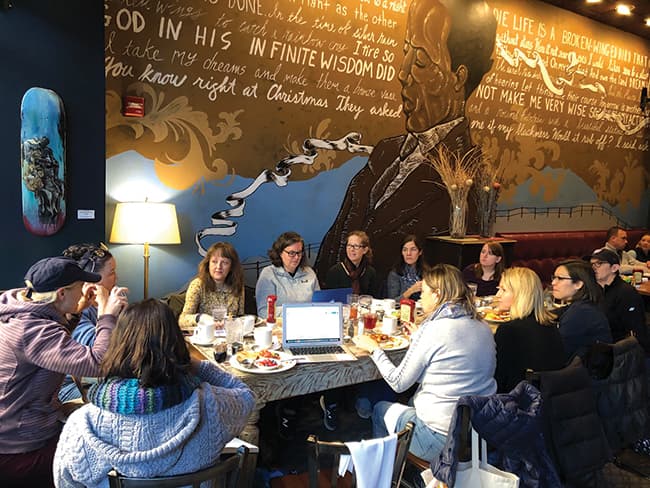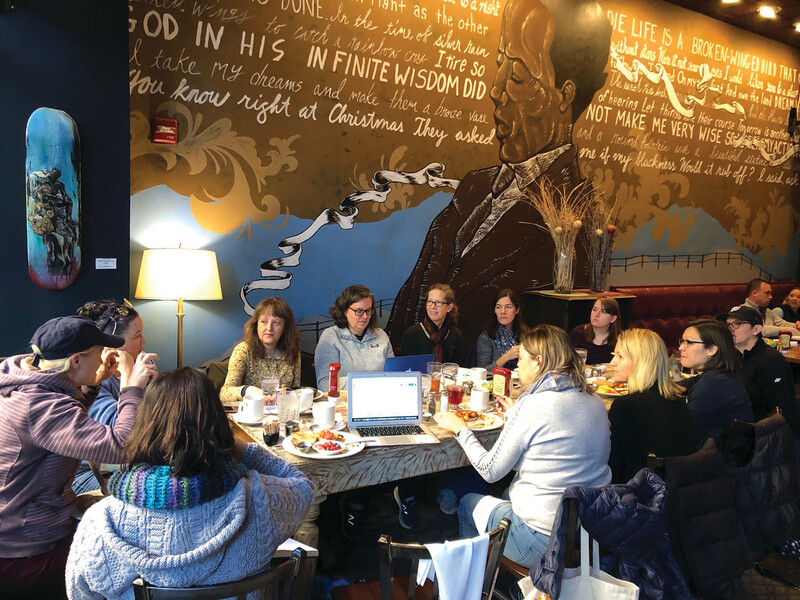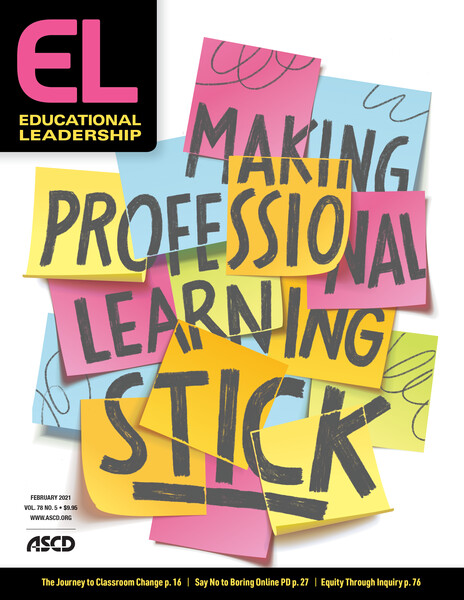You know that feeling when you have a conundrum in some aspect of your teaching and it just nags at you? It sits on your consciousness as you are falling asleep, as you are waking up, as you are savasana-ing after yoga, as you are driving to and from work. You might have a few minutes in the day to bounce an idea or two off a colleague to try to solve this challenge, but your conversation inevitably gets severed by another urgent need. You grow to slightly resent this one aspect of your teaching because you can't find the correct path to proceed on.
As teachers, we need an army of encouragers, a squad to cheer us on through the missed shots. We need a gaggle of supporters to hold us accountable and reach for the stars. We need professional development that doesn't just check a box mandated or guided by a distant school leader. It has to be personal and passion-fueled and make an actual, visible difference in our teaching practice.
Enter teacher research.
As defined by Marian M. Mohr and fellow teachers who wrote the book Teacher Research for Better Schools, "Teacher research is inquiry that is intentional, systematic, public, voluntary, ethical, and contextual." Many teachers learn about these aspects of teacher research in their master's or doctoral programs, but once teachers enter the workforce, professional learning is regularly mandated by the state's recertification process. True teacher research is when each researcher chooses his or her own topic and includes students in the research. This personalized process, plus monthly meetings, makes this type of professional development unique.

A teacher-research group from Arlington Public School District in Virginia meets at a local restaurant. Since the pandemic hit in 2020, the group has moved from in-person to online meetings. Photo courtesy of Sally Donnelly.
In 2017, Sally began teaching in the Arlington Public School District in suburban Virginia and saw a need to develop a teacher research club there. For 10 years prior, she had helped to facilitate similar groups in an adjacent district and missed that monthly time when teachers gathered, reflected, and discussed topics—an experience in professional learning she most looked forward to.
To start, Sally reached out to colleagues she knew from current and previous jobs and invited them to the club—and six accepted the invitation. She named the group ROTA TR CLUB. Rota, in Latin, means wheel, which is appropriate because a researcher often goes through a circular structure when following the research steps. They question, try, reflect, gather data, name findings, state implications for the future, create more questions, and start over again. The four letters in R-O-T-A also stand for the essence of what teacher researchers do—Reflect Often, Then Act. The group, which has now expanded to 34 members across three different cohorts, meets monthly on weekends or after school (currently, during the pandemic, they are meeting virtually), and participation is voluntary. Student data is collected in an ethical manner, and strategies are implemented and reflected on in the context of each researcher's classroom.
"I Got This"
For Meg, a practicing middle school teacher and participant in the group, the meetings feel like teacher therapy. The meetings start with reflection. Each teacher brings a challenge or question from their practice and reflects on it for 10 minutes. Some write in notebooks. Others open a computer file and begin to type. If someone is not sure what to write, we encourage them to ask, "Why am I here? What is my research question? How is it going?"
Then everyone in the group takes turns sharing their reflections from their journaling. Enlightened colleagues chime in, offering tidbits of tweaks and research-based feedback. The range of perspectives affords a wealth of knowledge. The real-time smiles and words of encouragement make participants feel like "I got this."
For example, in the beginning of the 2019–20 school year, Meg was teaching reading strategies to 8th graders and struggling to meet the needs of her students for a variety of reasons. Initially, she tried engaging her 8th grade readers in the Global Read Aloud program, but found that the communal reading and sharing of comprehension with other students was not reaching her students the way she had hoped. As she continued to build trust with them, she wondered if tapping into their creative strengths would be the best way to help students build their literacy skill set. But how to tap into those? She brought this quandary to the teacher research meeting: How can I creatively engage my students to improve their reading?
In the November meeting, she shared her frustration that she felt she wasn't meeting the needs of her students, and said she was feeling at a loss. Fortunately, her colleagues suggested multiple ideas, such as having students create character theme songs or host a "battle of the books." Sally also suggested that Meg apply for a Virginia teacher research grant to aid her in culling resources such as professional texts, books for her classroom library, and hands-on materials such as LEGO and cards for students to use in creative projects. Her colleagues encouraged Meg to survey students after trying each strategy to inform her next lesson.
Over the month of December, she used the suggestions the group gave her to build creative lessons with her school's librarian. Through surveys with Likert scales, she asked students to rank their engagement in particular lessons and how well the new approaches worked, refined the lessons based on the survey results, and tried again.
When the creative lessons still didn't improve engagement, Meg again turned to the group for support. They analyzed her student surveys and realized that though her students had very different learning styles, and therefore preferred different lessons over others, they all showed a high interest in social justice issues.
The teacher research group helped Meg develop an idea for a social justice-focused book club, where students could read books on topics they were passionate about and discuss them with peers. After the book club was established, students went from not reading much at all to 100 percent engagement during independent reading time. Meg's research ultimately showed her that building relationships with, and among, her students was the most effective way to engage them in reading, rather than attempting to tap diverse learning styles.
The teacher research group was there to support her every step of the way. She discovered that teacher research is a designated place to work through the challenges of day-to-day teaching, to be vulnerable, and to share strategies to support peers.
As in real therapy, the collective kernels of advice stay in our minds and encourage us to think about trying techniques or merely just interpreting situations and interactions differently. We leave these once-a-month sessions feeling rejuvenated, excited, enthralled, and totally ready to take on another month of life and teaching. It is healing. It is magic. It is therapy for your educator soul.
Choice, Concentration, and Company
As more teachers have tapped into their passion to explore a topic of their choice, our teacher research club has grown. What started out as a small group that Sally founded in her own personal time became a larger presence that the school district embraced. After the first year, a colleague from the initial cohort offered to lead a similar club at his school. During the third year, our district allowed teachers in the group to document their work with the club as part of our professional development recertification points. This coming year, even more teacher research groups will take place with cohorts of elementary, middle, and high school teacher researchers.
Why has interest in teacher research grown within our district? We believe it is because of what we call the 3 Cs: choice, concentration, and company.
Choice
As the school year begins, a teacher researcher reflects and brainstorms the ways in which she might want to grow professionally that year. It could be related to the school or state's goals, such as a focus on ELL students or equity, or it could be a personal goal for that teacher's practice, such as Sally wanting to provide choice and time for students to read during her reading class—but the key is that the goal is something the teacher identifies and chooses herself. As Mohr and coauthors write, "This degree of teacher choice and autonomy is often missing in traditional forms of teacher education and staff development that focus on generic problems." Having a choice in how to focus your professional development makes all the difference.
Concentration
Teachers juggle so much—building relationships with our students, planning content, responding to parents' needs and administrative requirements, and mastering remote learning. At the same time, teachers wonder how best to help their students learn. Many teachers start the school year with the best of intentions to focus on a topic or problem of practice and learn more about it. Then, as school starts and the months fly by, the issue gets overshadowed and the focus is lost. Committing to being a teacher researcher and attending monthly meetings with colleagues, however, can keep teachers focused on their goal and excited about their progress. Their question may broaden or narrow, but by the end of the school year in June, they can look back and see the learning that happened and the change in practice they gained through a year-long, concentrated focus on their topic.
Collective Knowledge
When teacher researchers get together to meet and work on problems in their teaching, a kind of magic happens. The collective knowledge (company) of the teachers, as well as the spirit of support, ensures that progress happens. Our cohort, for example, includes elementary and middle school educators from five different schools who teach math, science, and English, and act as support staff as librarians and reading coaches. This meeting of smart minds is diverse and allows for insightful discussions and a range of perspectives shared. When teachers talk it out loud in the company of others, their thinking becomes organized and their next steps grow clearer.
Our teacher research group gives us a professional learning option that does not feel like we are just complying and checking a box. Instead, the group taps into an inherent passion for teaching and allows us to explore the questions that have been on our minds in our own teaching practice.
Finding Fun in Research
Giving teachers choice in their professional development can be the difference between compliance and passion. With teacher research clubs like ours, teachers can grow professionally, set their own meaningful goals by identifying better ways to meet the needs of their current students, and build strong relationships with colleagues. It's a win-win situation, and one that we've found very rewarding.







